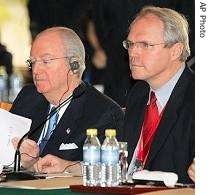-
(单词翻译:双击或拖选)
By Roger Wilkison
Beijing
18 December 2006
North Korea says it will not abandon nuclear weapons until all sanctions
 |
| US Assistant Secretary of State Christopher Hill, right, and US Ambassador to China Clark Randt at the opening of six-party talks on N. Korea's nuclear program, in Beijing, 18 Dec 2006 |
The North Koreans came with a laundry list of demands: U.S. financial sanctions imposed for its alleged3 counterfeiting4 of U.S. dollars and money laundering5 must be dropped.
U.N. sanctions imposed on it for conducting a nuclear test in October must also be lifted. And, Pyongyang wants a new light-water nuclear reactor6 built on its territory, the cost to be paid by others, before it will give up its nuclear weapons.
Delegations7 from China, Japan, Russia, South Korea and the United States want North Korea to begin implementing8 an agreement that all six countries signed in September 2005. Under that deal, the impoverished9 North is to abandon its nuclear weapons programs in exchange for aid and security guarantees from the other parties.
But since testing a nuclear device in October, Pyongyang now considers itself a nuclear power and wants to be treated on a par1 with the United States.
U.S. negotiator Christopher Hill told reporters his tolerance10 for North Korea's attitude is running out.
"The supply of our patience may have exceeded the international demand for that patience. And we should be a little less patient and pick up the pace an work a little faster," said Mr. Hill.
Hill says he will not meet bilaterally11 with the North Koreans until he consults with the other delegations.
Japan says the North Korean negotiating position is unacceptable. Host China, ostensibly an ally of Pyongyang, is demanding flexibility12 from all sides. South Korea says North Korea should take bold steps toward denuclearization and the other parties should be equally bold in offering incentives13 to Pyongyang.
Hill, referring to North Korea by its official name - the Democratic People's Republic of Korea, or DPRK, says the talks, which have been going on intermittently14 for three years, have reached a crucial point.
"Frankly15, I cannot tell you at this point which road the DPRK is choosing," he noted16. "We can go either road. We would like denuclearization by a diplomatic negotiation17, but if they do not want that, we are quite prepared to go the other road."
And that other road would mean a continuation of sanctions that Hill says would isolate18 North Korea even further to the detriment19 of its stagnant20 economy.
 收听单词发音
收听单词发音
1
par

|
|
| n.标准,票面价值,平均数量;adj.票面的,平常的,标准的 | |
参考例句: |
|
|
|
2
disarm

|
|
| v.解除武装,回复平常的编制,缓和 | |
参考例句: |
|
|
|
3
alleged

|
|
| a.被指控的,嫌疑的 | |
参考例句: |
|
|
|
4
counterfeiting

|
|
| n.伪造v.仿制,造假( counterfeit的现在分词 ) | |
参考例句: |
|
|
|
5
laundering

|
|
| n.洗涤(衣等),洗烫(衣等);洗(钱)v.洗(衣服等),洗烫(衣服等)( launder的现在分词 );洗(黑钱)(把非法收入改头换面,变为貌似合法的收入) | |
参考例句: |
|
|
|
6
reactor

|
|
| n.反应器;反应堆 | |
参考例句: |
|
|
|
7
delegations

|
|
| n.代表团( delegation的名词复数 );委托,委派 | |
参考例句: |
|
|
|
8
implementing

|
|
| v.实现( implement的现在分词 );执行;贯彻;使生效 | |
参考例句: |
|
|
|
9
impoverished

|
|
| adj.穷困的,无力的,用尽了的v.使(某人)贫穷( impoverish的过去式和过去分词 );使(某物)贫瘠或恶化 | |
参考例句: |
|
|
|
10
tolerance

|
|
| n.宽容;容忍,忍受;耐药力;公差 | |
参考例句: |
|
|
|
11
bilaterally

|
|
| [医]adv.两侧,双向地 | |
参考例句: |
|
|
|
12
flexibility

|
|
| n.柔韧性,弹性,(光的)折射性,灵活性 | |
参考例句: |
|
|
|
13
incentives

|
|
| 激励某人做某事的事物( incentive的名词复数 ); 刺激; 诱因; 动机 | |
参考例句: |
|
|
|
14
intermittently

|
|
| adv.间歇地;断断续续 | |
参考例句: |
|
|
|
15
frankly

|
|
| adv.坦白地,直率地;坦率地说 | |
参考例句: |
|
|
|
16
noted

|
|
| adj.著名的,知名的 | |
参考例句: |
|
|
|
17
negotiation

|
|
| n.谈判,协商 | |
参考例句: |
|
|
|
18
isolate

|
|
| vt.使孤立,隔离 | |
参考例句: |
|
|
|
19
detriment

|
|
| n.损害;损害物,造成损害的根源 | |
参考例句: |
|
|
|
20
stagnant

|
|
| adj.不流动的,停滞的,不景气的 | |
参考例句: |
|
|
|


















